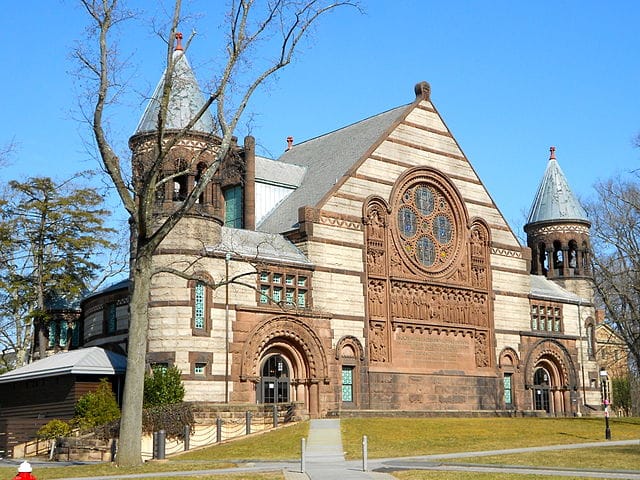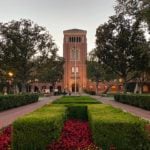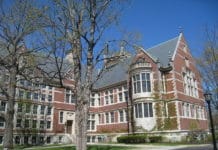Princeton University is renowned for educating the world’s foremost leaders, scholars, artists, and innovators.
Founded in 1746 in Elizabeth as the College of New Jersey, Princeton is the fourth-oldest university in the U.S. and one of only nine founded before the American Revolution. With such a long and varied history, Princeton has helped shape the nation itself.
The school is particularly known for educating both national and international leaders, including U.S. presidents James Madison and Woodrow Wilson, 12 Supreme Court justices, and royals from Jordan, Morocco, and Saudi Arabia.
Furthermore, dozens of Nobel and Pulitzer Prize winners are affiliated with Princeton, and hundreds of graduates have become Rhodes and Marshall Scholars.
Thus, it’s not hard to see why Princeton is often associated with the Ivy League, the most prestigious collegiate consortium in the nation and the world. The Ivies are a group of eight private research universities that have become synonymous with academic excellence and social prestige.
In this article, we’ll break down what it means to be an Ivy League school and how Princeton fits into the picture. Then we’ll discuss its rankings, acceptance rate, and tips to maximize your chances of getting in. By the time we’re done, you’ll have a better idea of Princeton, Ivy League culture, and whether they might be the right fit for you.
Is Princeton an Ivy League School?

Yes, Princeton is one of the eight Ivy League schools, which also include Harvard, Yale, Columbia, Dartmouth, Cornell, Brown, and the University of Pennsylvania.
The Ivy League originally began as an athletic conference in 1954 but quickly became associated with academic prestige, selective admissions, and social elitism. All eight Ivies dominate U.S. News’s National Universities rankings, placing in the top 18. In fact, the top spot has been claimed by an Ivy League every year since 2001, mostly by Princeton and Harvard.
The Ivy Leagues also receive the highest financial endowments in the country: Harvard’s is the most overall at $41.9 billion, while Princeton’s endowment per student is the highest at $2.88 million.
Ivy Leagues are usually larger than most liberal arts colleges but smaller than most public universities. As a result, Ivy Leagues combine the best of both worlds. With a total student population of about 8,500, Princeton provides an intimate atmosphere — thanks to a 5:1 student-faculty ratio — while housing the ample research opportunities and resources available to large universities. In fact, Princeton’s Firestone Library contains nearly four million volumes, making it one of the largest university libraries in the world. Princeton students lack very little, if anything, when it comes to research or pursuing their unique interests.
Princeton faculty are also well-known for their excellent teaching and research involvement. Notable faculty have included former Federal Reserve Chair Ben Bernanke, acclaimed author Joyce Carol Oates, and Nobel laureates Toni Morrison, Daniel C. Tsui, and Paul Krugman.
Finally, no discussion of the Ivy League is complete without mentioning athletics. The Princeton Tigers compete in 38 men’s and women’s varsity sports. The men’s and women’s rowing, men’s basketball, women’s soccer, men’s water polo, and football programs have been particularly successful over the years. Alum Bill Bradley — a former U.S. Senator, Rhodes Scholar, and New York Knick — was inducted into the Basketball Hall of Fame in 1983.
Princeton: Ranking, Acceptance Rate, and More
U.S. News has ranked Princeton #1 for the past 10 years on its roster of national universities. The school also performs well as the #2 best value school, #4 for best undergraduate teaching, and #1 for senior capstone projects. This last ranking is largely because Princeton requires every graduating senior to write a thesis, give a performance, or exhibit artwork that synthesizes their main course of study.
Washington Monthly, a college ranking site that judges colleges “based on what they do for the country,” places Princeton at #5 overall. In order to make the list, schools must be four-year institutions that award a significant number of doctoral degrees and also contribute to the public good in terms of social mobility, research, and public service.
Niche.com ranks schools based on student and alumni reviews as well as information from the U.S. Department of Education, resulting in a #6 for Princeton among the best colleges in America. It does even better when ranking by subject — it’s #2 in public policy, #2 in religious studies, #3 for history, #4 for engineering, and #5 for English. Indeed, Princeton is known for its excellence in every field of study offered there, especially for undergraduates.
Part of what makes Princeton a high performer on these lists is its need-blind admissions process. Applicants’ ability to pay has no bearing on admissions decisions, and those whose families make less than $160,000 per year receive at least full tuition. The school’s substantial endowment per student enables them to replace loans with grants. In fact, 82% of Princeton students graduate debt-free.
The acceptance rate usually fluctuates between 5-6%, but during the 2021 application cycle it dipped below 4%. Admission to the nation’s top school is more competitive than ever, but in the next section we’ll give you some tips on how to optimize your chances of getting in.
How to Get Into Princeton
Like other Ivy Leagues, getting into Princeton is notoriously difficult. Of the record high number of applicants in 2021 — 37,601 — only 1,498 were admitted. These students were particularly bright and made themselves stand out from the crowd.
GPA
How do you make your application stand out? For starters, your grades and test scores should be as good as you can get them. The average GPA of incoming freshmen is 3.9, but if the top GPA at your school is higher, you should also earn a higher GPA to stay competitive. You’ll have to earn nearly straight A’s in all classes, which must include APs, IBs, and Honors courses. Doing well with such a challenging course load shows Princeton admissions that you’ll thrive in their rigorous academic environment.
SAT/ACT Test Scores
If your GPA is below 3.9, you’ll need a higher SAT or ACT score to help compensate. But even if you meet the GPA requirement, your test scores still need to be pretty high: around 1505 for the SAT (765 in math, 740 in reading and writing) or 34 for the ACT.
The good news is that Princeton allows “superscoring” for SAT test takers — the school considers the highest scores for each test section across multiple attempts, and applicants can decide which results they want to send. Princeton only accepts the highest composite score for the ACT, but you can decide which test result you send in. (Other schools require you to send in every result.)
Bottom line: you should take either test as many times as you can in order to maximize your scores and, thus, your chances of getting in.
Extracurriculars and Letters of Recommendation
Grades and test scores are crucial to forecasting your college performance, but they’re not the only key component. Like the other Ivy Leagues, Princeton accepts only the upper crust of students, who have performed exceptionally well for their age in a given field.
For example, Princeton prefers the students who have won national chess championships over those who are just in the high school chess club. Even if you participate in other extracurriculars, this won’t matter unless you demonstrate particular excellence in a specific field. Quality matters over quantity.
You should also seek letters of recommendation from teachers who can vouch for your passion and success in your chosen field. Provide them with your personal statement, portfolio, and/or other materials that will help them write letters bursting with telling anecdotes that reveal why Princeton is the perfect fit for you.
Recap: Princeton Is an Ivy League School
The opportunities to learn from others and expand your horizons are limitless at Princeton. It’s no wonder so many clamor to go there and why it is truly special to be accepted.
Princeton University is an Ivy League school that offers unparalleled undergraduate and graduate education. Princeton excels in every other undergraduate and graduate field of study, whether in medicine, law, or business. Thus, the university produces world-class academics, scholars, leaders, engineers, and creatives.
Furthermore, Princeton is a great choice if you’re looking for an Ivy League in an idyllic suburban college town. And since university housing is guaranteed for all undergrads for four years, 98% of students live in campus dorms. These living arrangements foster a close-knit, supportive environment throughout students’ college careers.
If this sounds like a good fit for you, and you meet the stringent application requirements, you probably have a good chance of getting in and thriving at Princeton.
Princeton grads go on to high profile jobs in economics, politics, law, STEM, and the arts. Some notable grads include former first lady Michelle Obama, Amazon founder Jeff Bezos, NASA astronaut Pete Conrad, actress Brooke Shields, three-time Pulitzer Prize winner Thornton Wilder, and current Supreme Court justices Samuel Alito, Elena Kagan, and Sonia Sotomayor.














